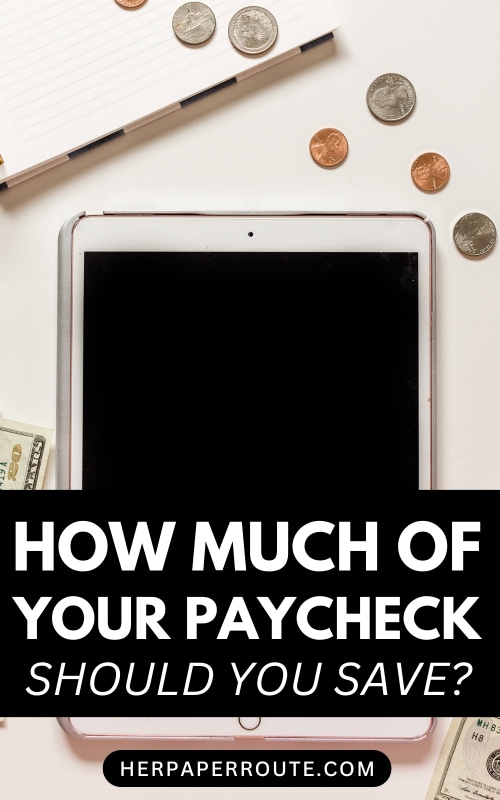How Much of My Paycheck Should I Save?

To have a healthy financial life, you need to start saving consistently. While this is easier said than done, it doesn’t take away from the fact that it is a critical building block of financial security.
If you’re like most people, saving for a rainy day is a luxury when you barely have enough to make ends meet. Many financial experts recommend setting aside 20% of your take-home income to go toward savings.
As an affiliate partner of various brands and sponsored content, HerPaperRoute may earn commission on qualifying purchases. Disclaimer
This includes things like short and long-term savings, an emergency fund, retirement benefits, and any other savings goal you might have.
The real question is – How much of my paycheck should I save? Is 20% enough? Here’s everything you need to know.
How Much of My Paycheck Should I Save
As far as this question goes, the answer to this varies depending on where you look. In reality, several factors influence the amount of money you need to save each month, such as what you earn, what your recurrent expenditure looks like, and of course, your savings goal.
Some financial experts suggest putting away 20% of your income. Others suggest saving 10%, while others recommend putting aside at least 30%.
The 50/30/20 budgeting rule suggests that 50% of your net income should go toward paying for essentials and channeling 30% toward non-essentials. The remaining 20% should go toward saving for a future financial goal, including paying off debt beyond the minimum-required installments.
What would be considered the “right” amount to save from each paycheck varies, depending on your fixed expenses, income, and financial goal, both in the short and long term.
Related: How to Live on a Budget and Save Money
Suppose you live in an area where the cost of living is high. You may need to spend more than 50% of your take-home income on living expenses alone. This would make it nearly impossible to save 20% of your paycheck each month.
Another example is if you have plans to purchase a home or put a sizable down payment in the next three years. In this case, you would need to be saving a lot more than 20% of your income to make this a reality.
The same applies if you want to retire early. You would need to save significantly more than the average worker to retire X number of years before your scheduled retirement date.
The point here is this: There’s no magic number that defines how much of your paycheck you should save. It varies depending on your specific circumstances at that point in your life.
Other Helpful Articles:
Savings Guidelines for Potential Goals You Can Work Toward
When figuring out how much of your paycheck you should save, it helps to think about your why. What are you saving for?
Having a specific goal you’re working toward will go a long way in helping you figure out how much you need to save each month.
Below are some common savings goals you can use to start building your financial wellness, as well as the amount of money you should save in each case.
Building an Emergency Fund
Life is unpredictable. You need to expect the unexpected.
Nothing takes the wind out of your sails, quite like incurring a huge, unexpected expense and not having enough money to cover it. That’s where an emergency fund comes in – to help you get through a hard time when the only thing you need to bail you out is money.
It helps you get out of a financial curveball in situations that involve a medical emergency, job loss, or big-ticket home or vehicle repairs. An emergency fund is a backup to ensure you never have to rely on loans and credit cards to cover those expenses.
How much money should you have saved in your emergency fund?
Again, it depends on your situation. As a rule, any backup fund or emergency savings account should have enough money to cover your living expenses for up to six months.
If you’re married with no kids, three months’ worth of living expenses is sufficient. If you’re single with kids or single without kids, your emergency savings should be able to cater for at least six months’ worth of living expenses.
If you have lots of kids, only one income, and job prospects aren’t looking good, you may want to see if a 12-month emergency fund makes sense.
Where you keep the funds also matters a great deal since an emergency fund differs from your other savings. It should be in an interest-earning account that generates more yield than what you would get in a standard savings account.
It should also be easily accessible when you need it. It is, after all, an “emergency” fund. A few great options to explore include a money market account or a high-yield savings account.
Paying Off Debt
The other thing you need to do with your savings is pay off high-interest and other consumer debt. Most consumer debt has high-interest rates and isn’t tax-deductible.
It ends up costing you significant amounts of money in the long run. Credit cards and some types of car loans are two examples of this.
Now, if you have a lot of debt, you need to channel a major part of your savings toward settling any outstanding amounts you may have to achieve financial freedom.
One way would be the Debt Snowball Method. This approach involves listing all the high-interest debts you have in order of their size and then paying off each one, starting with the smallest first, and so on until you’ve settled them all.
Keep in mind that this is an aggressive debt pay-off method, meaning any extra payments you get from your income should all go toward paying off your debt.
Related: How To Get Out Of Debt Fast
Another approach would be the Debt Avalanche Method. This strategy does the reverse of the Debt Snowball.
You would channel a sizable portion of your savings toward settling the debt with the highest balance and then pay the minimum-required installments on the rest of them.
Once the first one is fully repaid, you would do the same for the next highest one, and so on until all the outstanding debts are settled.
Saving for Retirement
The amount you should save for your golden years comes down to how old you currently are and the age at which you want to retire. If the company you work for offers a 401(k) that matches your contributions, maximizing your employer contributions is a way to get free money.
If you don’t have a 401(k) and would like to contribute to that fund, it would be prudent to speak with your financial advisor and open a Roth IRA. This is a special individual retirement account to which you would channel your after-tax contributions.
At retirement, your money will not be taxed at withdrawal since it was already taxed at the time you contributed to the fund.
As you decide how much of your paycheck you should save for retirement, keep in mind that the IRS has set limits on the maximum amount you can channel toward your retirement account every year.
Related: Can You Lose Money in an IRA?
Saving for Other Financial Goals
Once you’ve come up with a solid strategy to establish an emergency fund, repay debt, and start saving for retirement, you can then start working toward any other financial goals you might have.
This includes things like going on a vacation, saving for your kids’ college, or buying your very first home.
The amount of money you should put aside from each paycheck depends on your specific goal and when you want to achieve that goal. Here’s how to go about it.
Suppose you want to put aside a certain amount of money from your paycheck every month for a big purchase. You first need to figure out how much it costs and then set a time limit on when you want to have the funds.
Then, work backward to break up that dollar amount and determine how much you need to save up each month. That way, you know exactly how much you should have by the end of the year for X number of years until you reach your goal.
Depending on how far off your goals are, it’s important to take into account risk. If your goal is only 3-5 years away, it may not be smart to invest that money aggressively in a high-risk venture since you’ll need the money soon.
If you have lots of goals but aren’t sure where to invest or how to go about it, I recommend meeting with a certified financial advisor. You want to make sure they’re a fiduciary and have your best interests in mind instead of their own commissions.
Conclusion
The answer to – How much of my paycheck should I save isn’t as straightforward as you might have initially thought. It all depends on what your goals are and how much time you have to achieve them.
Consider working with a financial planner to help you chart a way forward and get you closer to achieving true financial freedom.
Related Articles:

Follow along on Instagram!









![52 Week Money Challenge [With Printable] 10 Cash beside a notebook trying the 52 Week Money Challenge](https://herpaperroute.com/wp-content/uploads/2022/09/52-Week-Money-Challenge-expplained-768x410.png)
